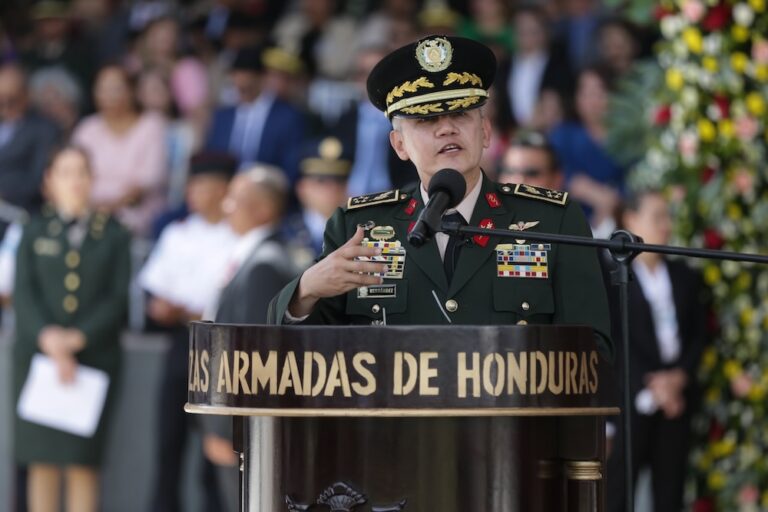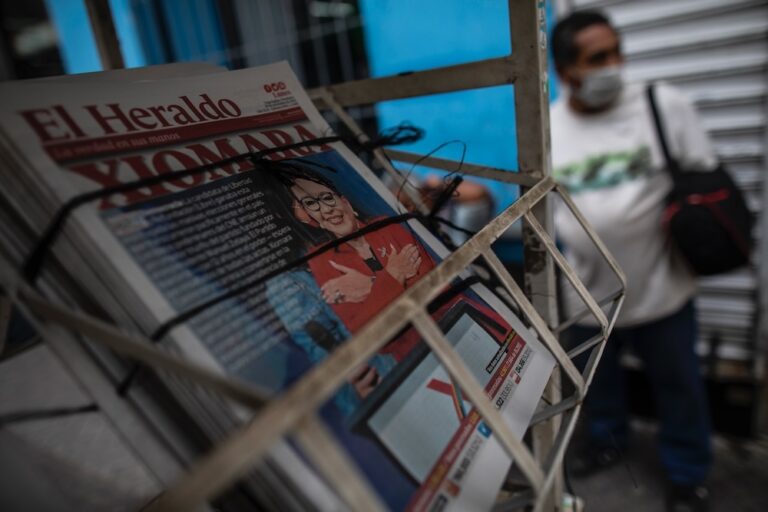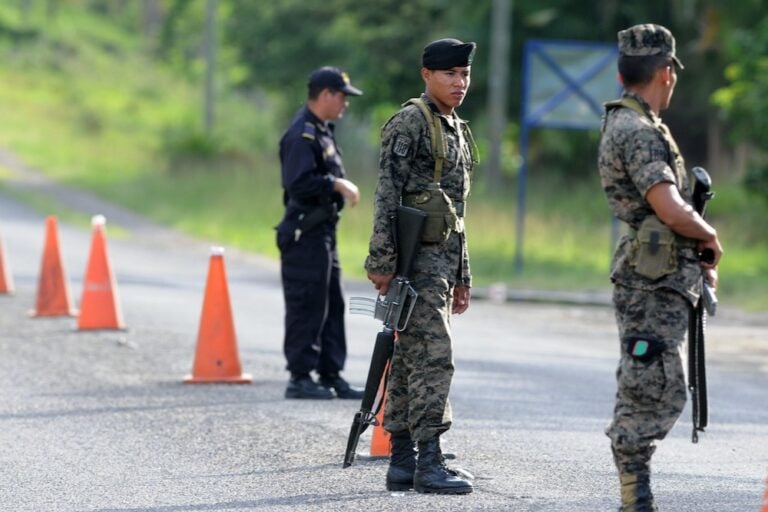A RSF special representative was in the Zacate Grande peninsula on 14 April 2011, and reports on the state of community radios in the region.
(RSF/AMARC/IFEX) – 28 June 2011 – Did Honduras’ readmission to the Organization of American States mark the end of the sinister interlude that began with the coup d’état exactly two years ago, on 28 June 2009, and its disastrous impact on civil liberties and human rights?
That was the question that the Latin America and Caribbean division of the World Association of Community Radio Broadcasters (AMARC-ALC) and Reporters Without Borders jointly posed when Honduras was formally readmitted to OAS at the start of this month.
The fight against impunity and for real media diversity is certainly as important as ever, according to members of La Voz de Zacate Grande, a community radio station in the far south of the country that is banned from the airwaves.
A Reporters Without Borders special representative was in the Zacate Grande peninsula for the community radio station’s first anniversary, on 14 April, and produced a long audio report of her visit. For the time being, it is available only in Spanish and can be downloaded at this link: http://dl.free.fr/gITEkPwVZ. A summary follows.
Most of the Honduran community radios affiliated to AMARC attended the 14 April event, which served to highlight the fact that defence of land rights was the main reason for the creation of most of these stations. La Voz de Zacate Grande is a particularly good example.
Decade-old struggle over unequality
The inhabitants of the Zacate Grande peninsula in the Pacific coast Gulf of Fonseca have been harassed constantly for the past 11 years for trying to defend their rights to land now claimed by businessman, landowner and palm oil magnate Miguel Facussé Barjum, who wants to develop major tourist projects there.
Several families from the Honduran oligarchy have also invested in coastal property with the aim of building luxury homes, while the authorities have used the international Ramsar Convention on the protection of wetlands as a pretext to deny the local rural population the right to create and manage projects that would benefit local community development.
Seeing themselves gradually encircled by the big landowners, local peasant farmers formed the Association for the Development of the Zacate Grande Peninsula (ADEPZA) and are trying to recover the lands on which their families have lived for generations. But the justice system seems to be using environmental and property-right laws to side with the big landowners.
Most of ADEPZA’s members are being prosecuted on charges of endangering the environment or land encroachment. They include the association’s secretary, Gerardo Aguilar, one of the 21 young people who work for the radio station. The land on which the station was built in the hamlet of Puerto Grande is claimed by Facussé. As community radio stations are not recognized in Honduras, ADEPZA president Pedro Canales is also charged with illegally using a broadcast frequency.
Two of the station’s female reporters, Elia Xiomara Hernández and Elba Yolibeth Rubio, are still facing prosecution on charges of sedition and resisting the police during their arrest while covering the forceful eviction of a family in the nearby locality of Coyolito. They have to report to a court on the neighbouring island of Tigre every two weeks. This requires taking a ferry, for which they have to pay the relatively costly fare.
A prosecution is still also pending against station director Franklin Meléndez, who was wounded in the leg in a shooting attack on 13 March by two men opposed to the demands that ADEPZA had been making on the air. His assailants were not arrested and continue to circulate freely in the area.
Such cases of violence do not surprise the local residents, many of whom have had to emigrate to the United States in order to escape poverty and to help address the needs of those who have stayed behind. Facussé is able to exploit this situation, offering property titles to those who agree to work for him and thereby encouraging division and conflict within the community. On the eve of the radio station’s anniversary, his wife toured the peninsula’s villages, distributing toys and candy to children.
La Voz de Zacate Grande tries to address such patronage by promoting public education through the free flow of information. The interviews conducted last April suggest that, rather than just a radio station, it is seen as an instrument for defending common interests.
Fragile reconstruction
Reporters Without Borders also visited the Afro-Honduran community in the Atlantic coast locality of Triunfo de La Cruz in April. Similarly, the local population would be unable to voice their objections to agro-industrial and real estate projects without the assistance of their radio station.
Radio Coco Dulce (also known as Radio Faluma Bimetu in the Garifuna language), which was created by OFRANEH (the Black Fraternal Organization of Honduras), was the target of repeated attacks last January which obliged it to suspend broadcasting for 12 days. The enforced silence came 12 months after it was forced off the air by an arson attack.
With the help of International Media Support, AMARC-ALC and Reporters Without Borders funded the rebuilding of Radio Coco Dulce after its destruction in January 2010. This year, they provided the station with a small video-surveillance system. Although badly needed, it did not prevent an arson attack on station manager Alfredo López’s home on 7 April, while the visiting Reporters Without Borders representative was in the area. Those responsible are still at large.
This action was made possible by the EU’s European Instrument for Democracy and Human Rights (EIDHR), of which Reporters Without Borders is a beneficiary.


